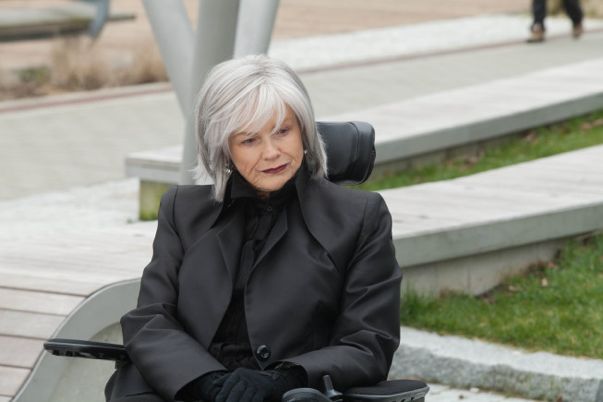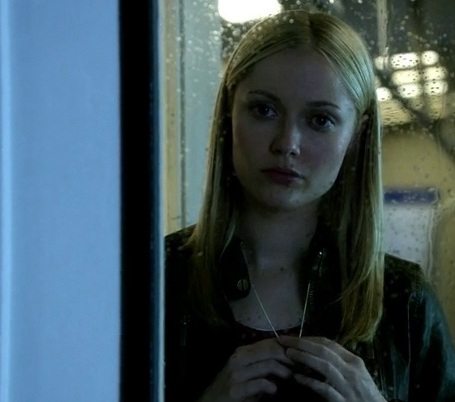Fringe – An Observer’s World In ‘Letters of Transit’
In its traditional self-contained and quirky episode of the season, Fringe took us to 2036, a future where Observers rule the world and the Fringe Division is merely a police force for surviving humans known as Natives. Agent Broyles still heads the division, but there is no trace of the original team. We spend the hour following a fresh new face, Etta, a young female agent who seems to have reasons of her own to look for the original team's whereabouts.
When "Letters of Transit" starts, we are introduced to Etta as she saves a Native friend who is about to be killed by an Observer. The pale invader from another time who was using his mind to kill the Native, scans Etta to make sure she doesn't have an ulterior motive, but finds nothing incriminating her. As it turns out, the young agent was meeting her friend about a Native in amber—a man she recognizes as Walter Bishop, one of the original members of the Fringe team.

The intriguing Etta, who can hide her thoughts from the Observers, brings the ambered-Walter to her colleague Simon, a lead agent and scientist who finds a way to extract Walter from the amber. Unfortunately, the original Fringe team member has sustained brain damage and is not quite himself. Enter an older Nina Sharp in a wheelchair and sporting white hair, who is a friend of Etta and believes that Walter could be healed by his brain tissues kept in the old Massive Dynamic building, the access to which is now restricted for Natives.Even if at times if felt like a caricature of a totalitarian regime, the show succeeded in conveying the general atmosphere of the planet taken over by an invading population of bald men in dark suits. Which, incidentally, makes one wonder where the women Observers are. If the invaders have left their inhabitable Earth in 2609, and if they still reproduce as humans do in 2036—which, considering the opening scene in the night club, seems to be the case—then it stands to reason that their ranks should have included female time travelers.The story did a good job with Simon. First by presenting an amber that could become a gas only for a few seconds, paving the way for his action toward the end, and later by getting him to tell us his story. We learned how his parents sent him away for his own protection and how he knew when he saw the Observers killing Natives (on the "Day of the Purge"), and that he would not rest until the invaders were defeated. With all that, even after getting Walter who designed the machine which could be used to defeat the pale visitors from another time, his sacrifice to save the other members of Walter's team could, to some degree, be understood.
In what is a testament to the talent of John Noble, Walter turned from mentally deficient to a leader of the resistance in no time, harsh in his manners and obliterating buildings without even a look back. Whenever his brain tissues removed by William Bell come into play, there is also the notion that the operation was performed because Walter didn't like who he was becoming. In this storyline, after he was injected with his liquid brain matter (I wonder how that worked), it was obvious in his deliberate rudeness and in his clear sense of direction that this wasn't our Walter. Cutting William Bell's hand wasn't just trying to be practical as our Walter would have been, it also came with a total lack of compassion and a coldness accompanying a quest of revenge that didn't escape Astrid.
Although the story and John Noble did a remarkable job with Walter, the episode really shined with what it did with Etta (or Henrietta, no doubt a name mirroring Henri, Peter's son with Fauxlivia). From her very first scene, there was something about the agent that grabbed the viewer. Fringe has always been more about (a version of) Olivia Dunham than about any other character, so whenever in the past she was absent from an episode, the void could be felt. In "Letters of Transit," the storyteller tackled that by giving us a character that could replace her by channeling some of the mystery surrounding our Olivia. It can be seen in the way Etta defended her friend from the Observer, in the way she was coy about her ability, in her relationship with Nina Sharp, and in the way she pushed Simon to do her biding. All that and her hairdo coupled with Georgina Haig's talent made Etta the central character we could easily connect with.Over the course of the story, it gradually emerged that the young agent's agenda was beyond just freeing the world from the Observers. The scene in which she insists that Walter might work better if he is surrounded by his original team particularly gave her away. By the end, when her father Peter Bishop takes her in his hands, even viewers who hadn't yet put all the pieces together realize why they must have felt they were watching Fringe all along. That was made possible because there was a piece of Olivia always with us in an episode where she was nowhere to be seen.

